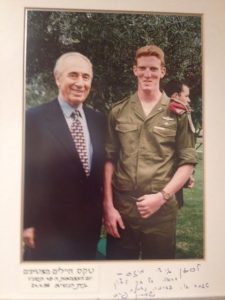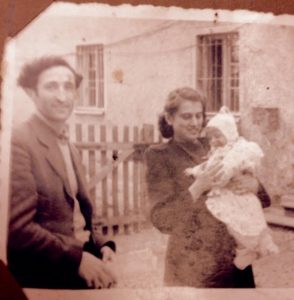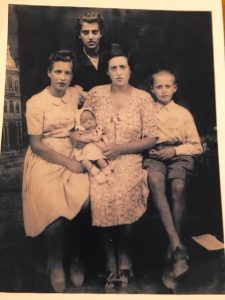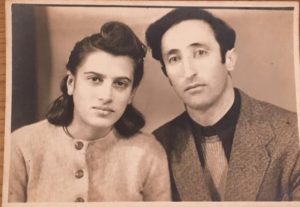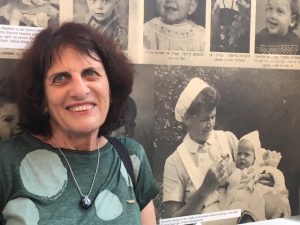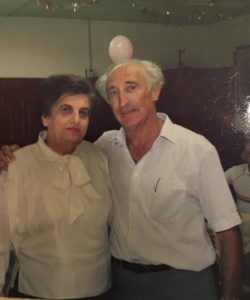Sara Moses-Kahan, Once there was a home, 2017
In November 2002 I was sitting with my partner in the hall of the Cameri Theater waiting for the performance of “Ghetto” to begin. Browsing through the program I was surprised to find a photo of the original program of the play that had been performed in the Vilna ghetto, on the basis of which, and on the basis of the diaries of Herman-Herschel Kruk (who was in charge of the ghetto library and who hid his diaries in the library walls), Yehoshua Sobol wrote his play. At the time, the play was called in Yiddish “The Man under the Bridge” - a popular comedy performed some 40 times in the suffering Vilna ghetto. In the list of actors I found the names of Gittel-Genia Shapiro and her husband, Shabtai Blecher. Gittel-Genia was my mother’s sister. Beautiful Genia, a gifted pianist who was 10 years’ older than my mother, perished in the infamous Klooga camp, in the swamps of northern Estonia. Her husband Shabtai, a famous playwright and actor in Poland, who was a close friend of the late Avraham Sutzkever, also perished in that same camp. My mother’s younger brother Lyovke, was murdered during the first months of the ghetto.
The play stirred something in me, and I decided to start investigating what happened to my parents and my family during the war.
So I travelled to Vilna, the city where my mother was born and brought up, and found the house in which she was born, and also paid a visit to the school where she studied. I went to the train station where my mother found herself after my grandfather had told her to ‘run away, my child, I’ll manage with the Germans’. I found the factories where she had to do forced labor, where she was starving, and there between Gorky and Astrakhan on the Volga and to Dushanbe and Andijan, between Russia and Uzbekistan and Kyrgyzstan, I experienced the colors, the views, the panoramas and the smells that were part of her life.
I also tracked the escape routes taken by my father – from Taurage to Šiauliai and on to Zagare on the Latvian border, where his mother – my grandmother – and two of his sisters were murdered, where they were buried in a mass grave in the center of town. My father continued alone traversing the continent, from Bishkek and Samarkand and on to Bukhara, and when he reached Khiva he joined the army in the Lithuanian division with his friends to take revenge on the Germans for the deaths of his family.
I crossed over the cotton fields that sear one’s eyes with their whiteness, those fields where my mother and father slaved from morning to night to complete the workload in order to earn their meagre ration at the end of the day. Father, critically wounded, arrived there from the Eastern front, and so did mother, to search for what was left of their family, and it was there, in the Tashkent hospital, that they met and found love.
In Tashkent my parents joined the Bricha (escape) movement (that helped to transfer European Holocaust survivors to ports of embarkation for Palestine), a group made up of the remnants of youth movements from Latvia, Lithuania and Poland. Sometimes by day, but mainly by night, bravely and stealthily they managed to help Jews escape westwards to freedom.
When they both decided to take advantage of the right of return given to the Poles to go back to their motherland, they travelled in a circus caravan via Hanover to Munich, and in the great St. Ottilien monastery, I came into the world.
We were always the three of us, what was known later as the order of three: father, mother and me – their daughter. No grandfathers, no grandmothers, no uncles or aunts, I never had any cousins, but I did have a family, one made up of my parents’ friends from their years of hardship, mainly from the Bricha movement.
When my parents came to Israel they were placed in the Rama transit camp (near Rehovot) after which they were transferred to the Bet Lid transit camp and became accustomed to their new lives with the howling of the jackals during the nights, sounds that reminded them of wounded babies, in a tent that dripped water in the winter and with the smell of the disinfectant DDT that mother couldn’t tolerate.
But it was here that my parents had a sense of self-fulfillment – father who had graduated from business school in Lithuania, and mother, who had graduated from the Vilna business school, were able to find employment, and were proud of me, their only daughter the social worker, and of course their grandchildren who grew up so beautifully. They worked, they volunteered, they loved life and were happy, while the memories “from there” remained in the background.

